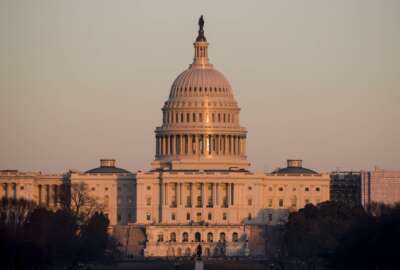To listen to the Federal Newscast on your phone or mobile device, subscribe on PodcastOne or Apple Podcasts. The best listening experience on desktop can be found using Chrome, Firefox or Safari.
- Agencies will not extend probationary periods that ended during the partial government shutdown. The Office of Personnel Management said the recent law granting federal employees back pay essentially transfers them back into pay status at the start of the furlough. OPM will use this interpretation for other human resources questions stemming from the shutdown. The recent lapse doesn’t impact previously-scheduled grade increases, time-in-grade requirements for promotions, or career-tenure requirements. (Chief Human Capital Officers Council)
- Some federal employees impacted by the partial government shutdown are still waiting for all, or parts of their back pay. The Interior Business Center said most of its clients have gotten their paychecks while others are waiting for adjustments or interim payments that will make them whole. The IBC said those payments should go out starting Tuesday with the most recent regularly scheduled pay period. (Federal News Network)
- A bipartisan group of lawmakers introduced legislation to protect transgender people from being separated from the military. Rep. Jackie Speier’s (D-Calif.) bill would also stop the Defense Department from barring anyone from joining the military based on gender identity. President Donald Trump directed DoD to ban transgender people from the military in July 2017. Sen. Kristen Gillibrand (D-N.Y.) is sponsoring the Senate version of the bill, which was introduced last Thursday. (Rep. Jackie Speier)
- Defense officials have touted the virtues of open systems architectures for years, but now the idea finally has some teeth. The secretaries of the Army, Navy and the Air Force signed a rare, joint memo to their own top acquisition officials, telling them that open systems are a “warfighting imperative.” They said the military needs commonly-understood data sharing standards so that future weapons systems can interoperate with one another from the first day they’re fielded. The memo builds on previous open systems work in the military services, but also tells officials to create new standards in technology areas that still don’t have them. (Federal News Network)
- The National Institute of Standards and Technology released its plans to set minimum cybersecurity standards for the internet of things. NIST released its draft plan in September on ways to protect agencies from IoT threats. But the agency said input from stakeholders revealed a “critical gap” on IoT cybersecurity guidance. (National Institute of Standards of Technology)
- Two senators are asking the Department of Homeland Security to take a closer look at virtual private networks or VPNs and other mobile services. In a letter to Chris Krebs, director of the Cybersecurity and Infrastructure Security Agency, Sens. Ron Wyden (D-Ore.) and Marco Rubio (R-Fla.) asked CISA to conduct a threat assessment on the national security risks posed to federal employees by VPNs, mobile data proxies and similar apps that may be vulnerable to foreign surveillance. Wyden and Rubio also asked Krebs to issue a binding operational directive prohibiting employees from using these applications if DHS finds these services pose a threat. (Sen. Ron Wyden)
- NASA chose Leidos to be its new provider of end user services. The space agency awarded Leidos the 10-year end-user services and technologies, or NEST contract, that could be worth $2.9 billion over the life of the deal. Under the firm-fixed-price, indefinite-delivery/indefinite-quantity vehicle, NASA will receive personal computing hardware, standard software, mobile IT services and other associated end-user services and supporting infrastructure. Leidos unseated HP Enterprise Services, which won the initial contract in 2010. That deal, called ACES, had an estimated value of $2.5 billion over 10 years.
- The Justice Department filed a lawsuit against contractor Mission Support Alliance, and Lockheed Martin affiliates, for allegedly violating the False Claims Act. DOJ said the defendants lied to the Energy Department about the amount of profit they would earn, on a multi-billion dollar environmental cleanup contract. The Justice Department also claimed one of the Lockheed subsidiaries paid a million dollars in kickbacks, to receive favorable treatment on a related subcontract. (Justice Department)
- The Environmental Protection Agency reported lower fines and payments from polluters. In its annual report, EPA said it collected $88 million in fines, restitution and court-ordered environmental project last year. That compares with more than $3 billion to $4 billion in the odd years of 2017, 2015 and 2013. The agency said those years were outliers because of the BP, Duke Energy and Volkswagen cases. EPA said it’s working with states under a revised cooperative federalism model, now in rulemaking. (Environmental Protection Agency)
- The U.S. Postal Service ended the first quarter of fiscal 2019 with a $1.5 billion loss, despite increased volume from last year’s holiday season, and the midterm elections. Postmaster General Megan Brennan wants Congress and the Postal Regulatory Commission to address longstanding challenges to USPS’ business model. A White House task force released its postal reform recommendations in December, but Congress has yet to act those proposals. (Federal News Network)
Copyright
© 2025 Federal News Network. All rights reserved. This website is not intended for users located within the European Economic Area.



